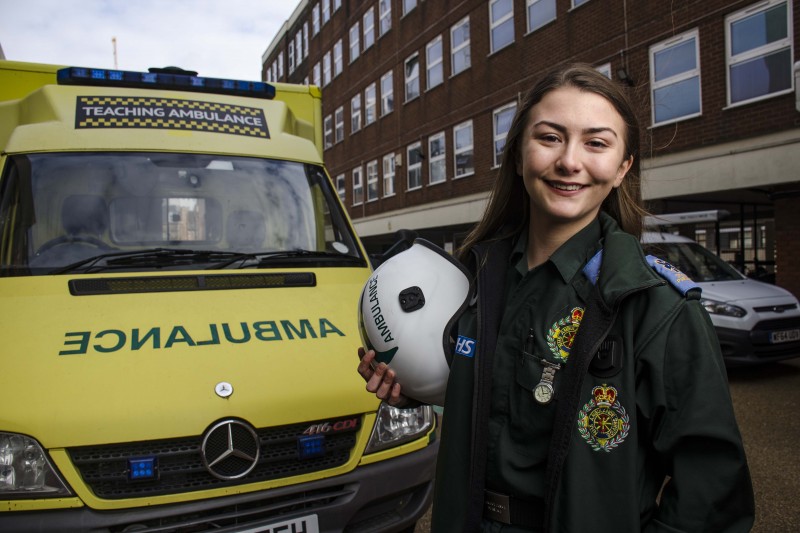Originally from Essex, and brought up in Spain from the age of five, Jasmine was 17 when she decided to come back to the UK on her own to study for her A-Levels and pursue a career in healthcare.
“Initially I wanted to become a doctor and managed to get a placement at Hereford Hospital where I was able to see some of the surgeons and doctors at work. I realised that I didn’t like the confinement of hospitals.
“Whilst I was volunteering to help the elderly in a care home, I was able to ask care workers lots of questions and realised that I wanted something a little more independent - that’s when a family member asked whether I’d considered para-medicine,” says Jasmine, student Paramedic.
After deciding on a Paramedic Science degree, Jasmine applied to five universities. The structure of the course Jasmine wanted to study set Bournemouth University apart from the others.
“I applied for five universities through UCAS, and had interviews for all of them. I came to BU for an interview, loved the location and the course really appealed to me. It’s very different in structure to lots of other universities, with placements that run alongside the course content.
“A lot of universities will have their students do six months at university and six on placement, whereas at BU it could be six weeks across both. We also have specialist placements like midwifery, paediatrics, and minor injuries so we are able to see everything,” said Jasmine.
Talking more about placements, Jasmine explains how she undertakes four different placements across the year and the variance between them.
“One of the placements might be on an ambulance or a rapid response vehicle with a specialist paramedic. We also had a mental health placement in our first year, with mental health specialists and those with mental health problems came to share their experiences.”
“In our third year, we go on to do a minor injuries placement where we practise our wound care and work with broken bones and sprains, learning the differences between these. This placement was my favourite because I’d like to go on to work in these areas in a minor injuries centre or a GP surgery.
“We’ve also worked on a service improvement project with other disciplines like nurses, physiotherapy and operating theatre practitioners, to create a product that can help to improve the health service. We also learn about the other areas of study and what their roles and responsibilities are in,” explains Jasmine.
Jasmine is passionate about her area of study and is hoping to make a difference within healthcare.
“I love paramedicine, and I can really see myself helping to change paramedic practice, I’m all about primary care and practice. BU is really good because we have so many hours on placement, around 750 hours a year.
“We get a lot of time with paramedics on an ambulance too. If you ever go to a traumatic scene, or anything that has upset you, we have really good support from the university and from the ambulance trusts too – they will always get in contact to make sure you are okay and there are lots of wellbeing services too, so you are not on your own.”
It can be hard to get experience in a paramedic crew or ambulance, so studying on this course has helped Jasmine get the hands-on experience she needs.
“Working for St John’s Ambulance, a voluntary organisation who teaches first aid, or working in a hospital to provide holistic care, is handy and can really help.
“Most of the students go on to join trusts across the country and even overseas as registered professionals after graduating. We interact a lot with our local trust, which visited BU to offer interviews and explain what kind of jobs they can offer in the future.
“At BU, it’s a bit like a three-year job interview and by the time you finish, a trust has a very good idea of what you are like as a person and your level of performance.”
Jasmine is thinking about staying in education after completing her Bachelor’s degree, focussing her studies in more specific areas to get where she wants to be.
“I’d like to study for an MA in Advanced Clinical Practice, and head into more specialist areas. There are a lot of opportunities for paramedics to head back to education after their degrees either via research and teaching, or further study in advanced areas like clinical practice, specialist critical care, and prescriptions for paramedics.”
Jasmine is keen to highlight the importance of Paramedics and how they can be utilised to improve patient care.
“We are independent practitioners, and it’s a real privilege because we are often the first healthcare professional to see someone, we’re at the forefront of patient care.”
“It’s a really exciting time for paramedics. The NHS have realised that they have a group of autonomous clinicians that they can use and can put into most departments and primary care roles, because they are at that level.”
Find out more about Bournemouth University’s Paramedic Science course.
